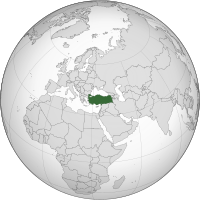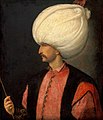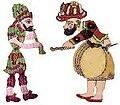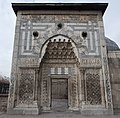Merhaba! Türkiye portalına hoş geldiniz. Hi! Welcome to the Turkey portal.
 | |

| |
Turkey, officially the Republic of Türkiye, is a country mainly located in Anatolia in West Asia, with a smaller part called East Thrace in Southeast Europe. It borders the Black Sea to the north; Georgia, Armenia, Azerbaijan, and Iran to the east; Iraq, Syria, and the Mediterranean Sea to the south; and the Aegean Sea, Greece, and Bulgaria to the west. Turkey is home to over 85 million people; most are ethnic Turks, while ethnic Kurds are the largest ethnic minority. Officially a secular state, Turkey has a Muslim-majority population. Ankara is Turkey's capital and second-largest city, while Istanbul is its largest city and economic and financial center. Other major cities include İzmir, Bursa, and Antalya.
Turkey was first inhabited by modern humans during the Late Paleolithic. Home to important Neolithic sites like Göbekli Tepe and some of the earliest farming areas, present-day Turkey was inhabited by various ancient peoples. The Hattians were assimilated by the Anatolian peoples, such as the Hittites. Classical Anatolia transitioned into cultural Hellenization following the conquests of Alexander the Great; Hellenization continued during the Roman and Byzantine eras. The Seljuk Turks began migrating into Anatolia in the 11th century, starting the Turkification process. The Seljuk Sultanate of Rum ruled Anatolia until the Mongol invasion in 1243, when it disintegrated into Turkish principalities. Beginning in 1299, the Ottomans united the principalities and expanded; Mehmed II conquered Istanbul in 1453. During the reigns of Selim I and Suleiman the Magnificent, the Ottoman Empire became a global power. From 1789 onwards, the empire saw a major transformation, reforms, and centralization while its territory declined.
In the 19th and early 20th centuries, persecution of Muslims during the Ottoman contraction and in the Russian Empire resulted in large-scale loss of life and mass migration into modern-day Turkey from the Balkans, Caucasus, and Crimea. Under the control of the Three Pashas, the Ottoman Empire entered World War I in 1914, during which the Ottoman government committed genocides against its Armenian, Greek, and Assyrian subjects. Following Ottoman defeat, the Turkish War of Independence resulted in the abolition of the sultanate and the signing of the Treaty of Lausanne. The Republic was proclaimed on 29 October 1923, modelled on the reforms initiated by the country's first president, Mustafa Kemal Atatürk. Turkey remained neutral during most of World War II, but was involved in the Korean War. Several military interventions interfered with the transition to a multi-party system.
Turkey is an upper-middle-income and emerging country; its economy is the world's 17th-largest by nominal and 12th-largest by PPP-adjusted GDP. It is a unitary presidential republic. Turkey is a founding member of the OECD, G20, and Organization of Turkic States. With a geopolitically significant location, Turkey is a regional power and an early member of NATO. An EU candidate, Turkey is part of the EU Customs Union, CoE, OIC, and TURKSOY.
Turkey has coastal plains, a high central plateau, and various mountain ranges; its climate is temperate with harsher conditions in the interior. Home to three biodiversity hotspots, Turkey is prone to frequent earthquakes and is highly vulnerable to climate change. Turkey has a universal healthcare system, growing access to education, and increasing levels of innovativeness. It is a leading TV content exporter. With 21 UNESCO World Heritage sites, 30 UNESCO intangible cultural heritage inscriptions, and a rich and diverse cuisine, Turkey is the fifth most visited country in the world. (Full article...)
Selected article -

Pınargözü Cave (Turkish: Pınargözü Mağarası, literally "eye of the water"), is a cave 18 kilometres (11 mi) west of the town of Yenişarbademli in Isparta Province, Turkey. It is considered the longest cave in Turkey, although it has not yet been fully explored, and the precise extent to which it has been explored is in dispute.
The entrance is on the slopes of Mount Dedegöl at an elevation of 1,550 metres (5,090 ft), in a forested area of the Kızıldağ National Park. It is easily recognized by the stream of water that pours continuously from its mouth, called the Devre Su. A constant wind of up to 166 km/h (103 mph) blows through the cave's narrow opening due to the chimney effect. (Full article...)
General images
Did you know -
- ... that the Fenari Isa Mosque

- ... that one of the accused assassins of Turkish former government minister Gün Sazak later hijacked an airplane to Bulgaria with accomplices? (February 21, 2014)
- ... that Matild Manukyan, a wealthy Turkish businesswoman of Armenian origin, made her fortune as a brothel owner? (March 14, 2007) Wikipedia:Recent additions 127
- ... that the McGhee Center for Eastern Mediterranean Studies in Alanya is run by Georgetown University as the only independent study program in Turkey? (November 12, 2007) Wikipedia:Recent additions 185
- ... that 14th-century Turkish polymath Al-Taftazani completed one of his best-known works at the age of 16? (December 22, 2008) Wikipedia:Recent additions 237
- ... that Hilton Istanbul Bosphorus
- ... that the Esma Sultana Mansion
Selected picture
Selected biography -
Mustafa Kemal Atatürk, also known as Mustafa Kemal Pasha until 1921, and Ghazi Mustafa Kemal from 1921 until the Surname Law of 1934 (c. 1881 – 10 November 1938), was a Turkish field marshal, revolutionary statesman, author, and the founding father of the Republic of Turkey, serving as its first president from 1923 until his death in 1938. He undertook sweeping progressive reforms, which modernized Turkey into a secular, industrializing nation. Ideologically a secularist and nationalist, his policies and socio-political theories became known as Kemalism (Atatürkism).
Atatürk came to prominence for his role in securing the Ottoman Turkish victory at the Battle of Gallipoli (1915) during World War I. During this time, the Ottoman Empire perpetrated genocides against its Greek, Armenian and Assyrian subjects; while never involved, Atatürk's role in their aftermath was the subject of discussion. Following the defeat of the Ottoman Empire after World War I, he led the Turkish National Movement, which resisted mainland Turkey's partition among the victorious Allied powers. Establishing a provisional government in the present-day Turkish capital Ankara (known in English at the time as Angora), he defeated the forces sent by the Allies, thus emerging victorious from what was later referred to as the Turkish War of Independence. He subsequently proceeded to abolish the sultanate in 1922 and proclaimed the foundation of the Turkish Republic in its place the following year. (Full article...)
Selected video -
Selected quote -
| “ | Today the Soviet Union is a friend and an ally. We need this friendship. However, no one can know what will happen tomorrow. Just like the Ottoman and Austro-Hungarian Empires it may tear itself apart or shrink in size. The people that it holds so tightly in its grip may one day slip away. The world may see a new balance of power. It is then that Turkey must know what to do. Ally Soviets have under their control our brothers with whom we share language, beliefs and roots. We must be prepared to embrace them. Being ready does not mean that we will sit quietly and wait. We must get ready. How does a people get prepared for such an endeavour? By strengthening the natural bridges that exist between us. Language is a bridge... Religion is a bridge... History is a bridge... We must delve into our roots and reconstruct what history has divided. We can't wait for them to approach us. We must reach out to them. | ” |
Recognized content
Provinces
Related portals
Religions in Turkey
Neighbouring countries
Countries with related heritage
WikiProjects
Turkish wikipedia
 |
There is a Turkish version of Wikipedia, the free encyclopedia. |
Wikimedia
The following Wikimedia Foundation sister projects provide more on this subject:
-
Commons
Free media repository -
Wikibooks
Free textbooks and manuals -
Wikidata
Free knowledge base -
Wikinews
Free-content news -
Wikiquote
Collection of quotations -
Wikisource
Free-content library -
Wikiversity
Free learning tools -
Wikivoyage
Free travel guide -
Wiktionary
Dictionary and thesaurus











































































































